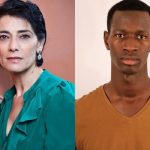Ahmad Ghosseins first feature film, All This Victory, is as much about the July 2006 war and a universal human story as it is about a Middle East film that has won a significant award at Europe’s oldest film festival. In a small village in southern Lebanon, during the last days of the July War […]

Ahmad Ghosseins first feature film, All This Victory, is as much about the July 2006 war and a universal human story as it is about a Middle East film that has won a significant award at Europe’s oldest film festival.
In a small village in southern Lebanon, during the last days of the July War of 2006, five people try to escape the bombing: a young woman with her older husband, two old men, and Marwan, a young man recently arrived from Beirut who is looking for his father. They decide to hide in the basement, but Israeli soldiers enter the house above them. They are trapped in their location and by their own fears, and the situation soon spirals out of control.
Ahmad Ghosseins first feature-length film, All This Victory is inspired by a true story of two men trapped in their home during the war. His obsession with the story has personal moorings as well. His mothers home was destroyed in that war and the protagonists quest for his father mirrors his own generation growing up with missing fathers working outside Lebanon. However, as a filmmaker and visual artist who has had art installations exhibited in major galleries around the world, the drama unfolding in a single room must also have been a compelling draw.
It is debatable whether Ghossein found it more difficult to maintain continuity with five actors over 26 days of intense shooting, than to endure the long years it has taken his film to finally see the light of day. When Broadcastpro ME spoke to the filmmaker after his film won the Czech Republics Karlovy Vary Work In Progress award, there was little doubt what he found more invigorating.
I enjoy directing actors, he says. As a director, my challenge during the shoot was to keep actors in the same frame of mind. We had conducted a lot of workshops, and while rehearsing we allowed for improvisation, which helps because the movie is not dialogue-heavy. The shots that had the five actors in the frame were particularly difficult, since they were not shot in sequence. For 10 whole days, they also had to be wet and covered in dust, and if the shots had to be repeated, the process would have to be redone. My actors were extremely patient and professional.
 A prominent theatre actor, two professors from the acting school Ghossein attended and several newcomers made up the cast. While there was complete faith in LA-based Lebanese DoP Shadi Chabaan, Ghossein is a perfectionist: I dont move to another take until I am satisfied. Sometimes I will repeat a shot 10 to 12 times and then move to the next.
A prominent theatre actor, two professors from the acting school Ghossein attended and several newcomers made up the cast. While there was complete faith in LA-based Lebanese DoP Shadi Chabaan, Ghossein is a perfectionist: I dont move to another take until I am satisfied. Sometimes I will repeat a shot 10 to 12 times and then move to the next.
With post-production, Ghossein is similarly involved in ensuring every frame meets his standards. The Karlovy Vary award gave Ghosseins team post-production services valued at $116,362, including services at production houses UPP and Soundsquare, and a $11,636 award from Barrandov Studio all in the Czech Republic.
While sound mixing and colour grading is currently in progress at the Soundsquare studio in the Czech Republic, VFX is being done at the HeCAT studio in Paris. Apart from two visits to Paris, the process is now long-distance, says Ghossein. He says finishing a film is as exhausting as delivering a child, and the most energy-sapping process was putting together the finances. Ghossein unequivocally thanks Beirut production company Abbout Productions.
When All This Victory won the prize at Karlovy Vary, it was a validation of our belief in Ahmads vision. In fact, this year was the first time that Karlovy Vary included films from the Middle East, so winning was huge for the Lebanese film industry as well, says producer Myriam Sassine, who spoke to BroadcastPro ME following the presentation at the festival.
Established in 1998, Abbout Productions has a mission to help build Lebanese and Arab cinema into an industry. While Ghossein was planning a low-budget first feature film, it was apparent that All This Victory would need extensive VFX and sound mixing in post-production. We had built the expenses into our initial budgets, reveals Myriam.

As an independent art-house film with a unique setting, Myriam says All This Victory was not easy to produce. We started in 2011. A number of funds such as the Doha Film Institute, the Arab Culture Fund AFAC, Swiss fund visions sud est and French fund Organisation internationale de la Francophonie (OIF) offered funding. We have a pre-sales deal with a TV channel for the MENA region. Most importantly, we had private investors who gave us enough money to produce the film. The post-production process is being helped with awards such as the one from Karlovy Vary. It has been a long process, and now we are happy we are almost at the finishing line.
Conversations with both Ghossein and Myriam make it clear that they share the urgency to tell the human stories around the forgotten war of 2006. However, when asked about the inclusion of Israeli characters (who you dont see but hear speaking Hebrew on the upper floor) and the political travails that Ziad Doueiri, director of The Insult, overcame on the way to a Best Foreign Language Film Oscar nomination, Myriam stressed that they made sure not to transgress any laws.
For Ghossein, politics is incidental. It is primarily a human story and the enemy on the floor above could be anyone. Helping him with the treatment of the film in pre-production was Abla Khoury, a theatre director and film producer who Ghossein says is good with character and dialogue. Greek director and actor Syllas Tzoumerkas collaborated towards creating an international structure for the film.
Abla Khoury and Lara Karam Chekerdjian, co-founders of Ginger Beirut Productions, were line producers for All This Victory. On choosing the company, Myriam says: Abla and Lara had worked on The Insult. We knew we were in good hands when they were on the set every day ensuring the director had everything he needed. While we are closely involved in pre- and postproduction, the actual shoot is a time when the director needs to have space with his creative process.
Equipped with ARRIs Alexa camera and ARRIFLEX handgrip, and Cooke S4 lenses, the filmmaker embarked on a challenging shoot.
The ceiling of the room where most of the shoot took place was low, so all the light had to come in from the sides. I worked with the art director to create a certain look before the soldiers come in and a different look after they enter. The camera was selected because it is the best, and the latter half of the film called for handheld shots.
With not too much dialogue, the film relies heavily on light and music. Ghossein worked with Khyam Allami, who mainly used electronic music (even an electronic oud) to create the ambience for the film.
It took six minutes and three shots to impress the international jury at Karlovy Vary. Myriam elaborates: The first footage we showed depicts the arrival of the main character as he discovers his house destroyed. The second scene depicts the moment the civilians realise that the enemy soldiers have barged into the first floor. The third clip depicts the moment the civilians start to get delusional, imagining there are tunnels to escape and so on.
Even before the award was announced, jury members and representatives of the twenty shortlisted films (from hundreds that reportedly applied) approached the duo to laud the film. The film was also shortlisted for the prestigious Venice Production Bridge (VPB), with more than 2,200 industry professionals in attendance at the 2018 edition.
The final ambition for the film, and for any independent filmmaker, is to be accepted in an A-grade festival Venice, Berlin, Cannes and to be distributed worldwide, says Ghossein. We are also hoping for a wider commercial release in Lebanon and the region. It is a pity that the Dubai International Film Festival has been cancelled; it was an excellent regional platform.
On the film industry in Lebanon, Ghossein sounds an optimistic note: I believe the industry is transforming in Lebanon, and Abbout Productions has played a critical role in that process. Earlier, we had individuals outside of Egypt trying to make a difference. Today, we have production companies that are looking not just at commercial films, but also independent films like mine. Their vision is to have Lebanese cinema on the map. While it has always been difficult for Arab films to get funding, we now have private investors in the fray, which makes a big difference.
No stranger to the big stage, Ghossein has seen his works (shorts and video installations) exhibited in Berlin, New York and Cannes. However, All This Victory is the first feature-length expression of his primary motivation as an artist to find the connection between individual human experiences and shared historical and political realities.











































































